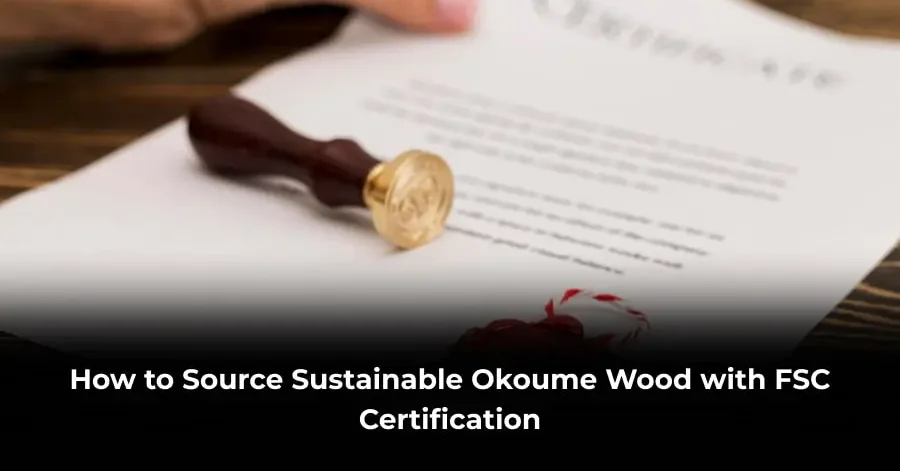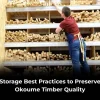For woodworkers, furniture makers, and boat builders, few materials stir the senses quite like Okoume wood. Known for its beautiful pinkish-salmon hue, straight, fine grain, and remarkably light weight, it’s a dream to work with. But in an age where our environmental footprint is under the microscope, the joy of creating must be balanced with the responsibility of sourcing. The question is no longer just “Where can I find hardwood timber for sale?” but “How can I find it in a way that protects the very forests that provide it?” This shift in mindset is what separates a casual hobbyist from a truly dedicated artisan.
This comprehensive guide is for the conscious creator. We’ll walk you through the entire journey of ethically sourcing one of the most sought-after woods, ensuring that the beautiful Okoume wood in your next project supports the health of our planet and its people. We’ll delve into why FSC certification is your non-negotiable north star, how to find and vet reputable hardwood timber suppliers, and what critical questions to ask before you make a purchase. This isn’t just about buying wood; it’s about investing in a sustainable future for craftsmanship.
Why Okoume Wood? Understanding the Allure and the Anatomy
Before we dive into the intricacies of sourcing, let’s take a moment to truly appreciate why Okoume wood has earned such a revered spot in workshops around the world. Hailing from the dense, humid forests of West-Central Africa, primarily Gabon, Equatorial Guinea, and the Republic of Congo, Okoume (Aucoumea klaineana) is a fascinating deciduous hardwood timber that possesses many of the workable qualities of a softwood.
Its most celebrated characteristic is its stellar strength-to-weight ratio. It’s exceptionally light, making it a premier choice for marine plywood cores, kayaks, canoes, and even in the construction of light aircraft where every single pound counts. Its stability and ease of working with both hand and machine tools—it planes, sands, and glues beautifully with minimal blunting of your tools—make it a favorite in fine cabinetry, decorative millwork, and high-quality veneer production. However, this very popularity has historically been a double-edged sword. High, unchecked demand led to periods of unsustainable logging practices, threatening the biodiversity and ecological balance of its native regions. This is the pivotal point where our role as informed, responsible consumers begins. Choosing Okoume wood is a choice that now comes with a profound responsibility.
The Gold Standard: What is FSC Certification and Why Does it Matter?
When you’re seriously looking for quality hardwood timber for sale, you’ll inevitably encounter the acronym “FSC.” The Forest Stewardship Council is not just a logo; it’s an international non-profit organization that has established the most rigorous and globally recognized gold standard for responsible forest management. Think of it as a system of checks and balances that extends from the forest floor to your workshop floor.
An FSC certification on a plank of Okoume wood isn’t just a sticker; it’s a story of stewardship. It tells you that the specific forest it was harvested from is managed according to a comprehensive set of principles designed to preserve natural biodiversity, protect water quality, benefit the lives of local communities and workers, and ensure long-term economic viability—all while actively safeguarding the forest for generations to come. For you, the woodworker, choosing FSC-certified wood from reputable hardwood timber suppliers means:
- Verifiable Sustainability: You have the power to trace the wood back to a specific, responsibly managed forest, moving beyond vague claims.
- Ethical Assurance: You are consciously supporting forestry practices that protect workers’ rights, uphold safety standards, and respect the land rights of indigenous communities.
- Enhanced Market Access: A growing number of architects, corporate clients, and environmentally-conscious consumers now mandate FSC-certified materials for their projects, giving you a competitive edge.
- Personal Peace of Mind: You can pour your heart into your craft with the confidence that your creation isn’t contributing to deforestation or ecological harm.
When evaluating potential hardwood timber suppliers, their demonstrable commitment to and inventory of FSC-certified products is the first and most critical filter to apply in your selection process.
Your Step-by-Step Guide to Sourcing FSC-Certified Okoume
Sourcing sustainable wood requires a bit more diligence and a shift from being a mere buyer to becoming an investigator, but the process is deeply rewarding and integral to modern craftsmanship. Follow these detailed steps to become a savvy, responsible, and influential buyer.
Step 1: Start with a Clear and Detailed Project Plan
Long before you contact a woodworking supplies store or a specialist importer, know exactly what you need. Precisely calculate the required board feet, specific thicknesses, desired grade (e.g., clear vs. select), and the final dimensions of the Okoume wood required for your project. This level of precision prevents over-ordering and material waste, which is a core, often overlooked, tenet of sustainability. An accurate plan ensures you only purchase what you will truly use.
Step 2: Identify and Research Specialized Hardwood Timber Suppliers
Your local big-box woodworking supplies store is unlikely to be a reliable source for FSC-certified Okoume wood. Your search must focus on specialized timber importers, lumberyards, and dedicated hardwood timber suppliers who have a demonstrated, long-term commitment to stocking and promoting certified products. Spend time online looking for suppliers who don’t just list FSC as an option, but who feature it as a core part of their company ethos and product offering on their websites.
Step 3: Meticulously Verify the Certification Authentically
In the world of green marketing, claims can be cheap. Your job is to be the verifier. When you find a potential supplier, look for the specific FSC label on their website or directly on the material:
- FSC 100%: This is the purest grade, meaning all the wood in the product comes from impeccably managed FSC-certified forests.
- FSC Mix: This means the product is made from a controlled mix of FSC-certified wood, recycled materials, and/or controlled wood, which mitigates the risk of sourcing from unacceptable sources.
- FSC Recycled: Indicates the wood or fiber is 100% post-consumer or post-industrial recycled.
Do not hesitate to ask your potential hardwood timber suppliers for their FSC certification code. You can and should verify this unique code on the official FSC website database to confirm its current validity. This simple act of due diligence is what separates the truly committed hardwood timber suppliers from the merely opportunistic.
Step 4: Inquire Confidently About the Chain of Custody
The “Chain of Custody” (CoC) is the unbroken, documented paper trail that follows the Okoume wood from the certified forest to your workshop’s doorstep. Every single entity that handles the wood—the logger, the sawmill, the exporter, the shipper, the importer, and the final distributor—must themselves be FSC Chain of Custody certified. This complex but vital system ensures that the certified wood is never contaminated or mixed with uncertified wood along its journey. Transparent and reputable hardwood timber suppliers will be proud of their CoC certification and readily provide you with the necessary documentation.
Step 5: Evaluate the Tangible Quality and Customer Service
Once you’ve confidently confirmed the sustainability credentials, you can then assess the supplier on the traditional metrics that matter. What is the actual, physical quality of their Okoume wood? Is it well-milled, properly dried, and free of excessive defects? Are their prices competitive and fair for certified material? Is their customer service team knowledgeable and responsive? A supplier that excels in both unwavering sustainability principles and outstanding product quality and service is a true long-term partner for your craft or business.
Step 6: Consciously Consider the Full Lifecycle of the Wood
Sustainable sourcing doesn’t end the moment your purchase is delivered. Think holistically about how you’ll use the hardwood timber for sale. Carefully optimize your cutting patterns to minimize off-cuts. Find creative uses for smaller scraps—from inlay work to small craft projects. Use sawdust and shavings for garden compost or as animal bedding. By planning your projects to radically reduce waste, you are honoring the tree and making the most of every single beautiful board foot of Okoume wood.
Also Read – What is a Wood Grading System? The Ultimate Guide for Professionals
Where to Find Your Sustainable Okoume Wood: A Practical Approach
While a generic online search for “hardwood timber for sale” might yield some results, you will have a much higher success rate and a better experience with more specific, targeted queries like “FSC-certified Okoume importers,” “sustainable African hardwood suppliers,” or “specialist hardwood timber suppliers near me.” Building a lasting, communicative relationship with a specialized supplier is almost always more reliable and insightful than a one-time, transactional purchase from an unknown online woodworking supplies store. They can provide invaluable advice on grain, seasonal availability, and optimal grades for your specific project.
AEW Woods: Your Partner in Sustainable and Ethical Sourcing
In your dedicated search for quality, ethically-sourced wood, you will eventually find partners who genuinely share your values and vision for a sustainable industry. One such name that consistently stands out among discerning woodworkers, boat builders, and professional hardwood timber suppliers is AEW Woods.
AEW Woods has meticulously built a robust reputation not just as a seller of timber, but as an active steward of the world’s precious timber resources. They deeply understand that the unique properties and beauty of Okoume wood must be perfectly matched by an unwavering, tangible commitment to the forests and communities it comes from. They proactively and selectively source their FSC-certified Okoume wood, ensuring a fully documented, transparent, and responsible supply chain from the tree to the timber yard. For serious woodworkers who prioritize both exceptional, reliable quality and unassailable environmental integrity, connecting with a dedicated supplier like AEW Woods simplifies and validates the entire sourcing journey. They represent the kind of forward-thinking, dedicated hardwood timber suppliers that make responsible woodworking a practical, professional, and deeply fulfilling pursuit, offering a trusted and consistent source for this premier hardwood timber for sale.
Conclusion
Sourcing sustainable Okoume wood with legitimate FSC certification is more than a mere procurement task; it’s a profound philosophical choice and a mark of a modern, responsible craftsman. It’s a conscious commitment to a legacy of craftsmanship that genuinely honors the material’s origin and ensures its availability for the future. By choosing to diligently seek out and support responsible hardwood timber suppliers, rigorously verifying FSC claims, and partnering with companies like AEW Woods that prioritize these values at their core, you do so much more than just build beautiful objects.
You become an integral part of a global chain of custody that values people, planet, and profit in equal measure. You actively ensure that the unique, irreplaceable beauty and utility of Okoume wood will be available to inspire the craftsmen and craftswomen of tomorrow. So, on your next visit to a woodworking supplies store or your next online search for that perfect hardwood timber for sale, carry this knowledge and sense of purpose with you. Let your deliberate choice of wood tell a powerful, compelling story of beauty, integrity, and profound respect for the world we all share and are duty-bound to protect.
Frequently Asked Questions (FAQs)
- Is all Okoume wood sustainable?
No, not inherently. While Okoume wood can be harvested sustainably, much of it has been logged without proper management. The only way to guarantee sustainability is to purchase wood with a valid FSC or equivalent certification from reputable hardwood timber suppliers. - Is FSC-certified Okoume wood much more expensive?
There can be a price premium, typically 10-20%, due to the costs of sustainable forest management and certification audits. However, many find the cost a worthwhile investment for the environmental benefits, ethical assurance, and the growing market demand for certified products. - Can I find FSC-certified Okoume at my local woodworking supplies store?
It depends on the store. Larger, specialized, or environmentally-focused retailers often carry it. It’s always best to call ahead and ask specifically for FSC-certified Okoume wood. If they don’t have it, they may be able to order it or direct you to hardwood timber suppliers who can. - What are the main alternatives to Okoume wood if I can’t find it certified?
If you cannot source certified Okoume wood, consider other light hardwoods with similar working properties. Paulownia or Western Red Cedar (from certified sources) are excellent alternatives for many applications. Your trusted woodworking supplies store or timber merchant can advise on the best locally-sourced, sustainable alternatives. - Besides FSC, what other certifications should I look for when buying hardwood timber for sale?
Other credible certifications include the Programme for the Endorsement of Forest Certification (PEFC) and, in North America, the Sustainable Forestry Initiative (SFI). However, FSC is generally considered the most rigorous and globally recognized standard by major environmental groups.






